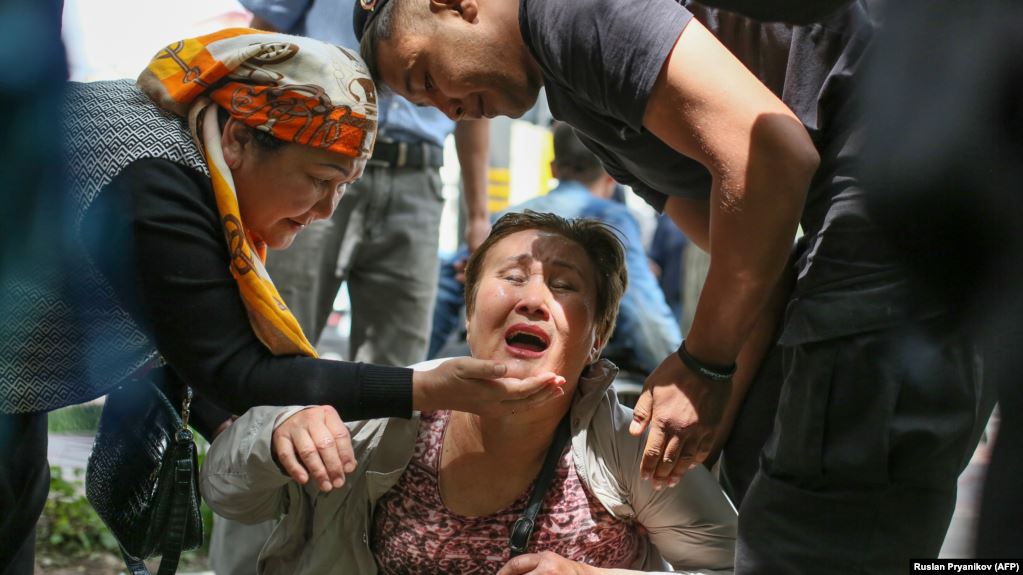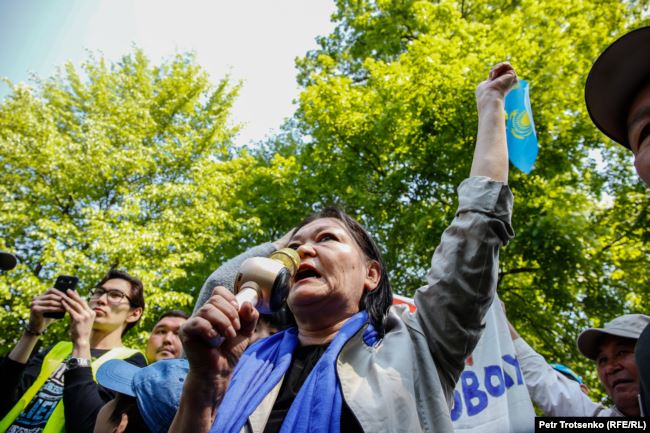
Wake up, Kazakhstan.
That’s the name of a new movement that appeared in Kazakhstan just prior to the June 9 presidential election. But it could just as well have been advice to anyone following the campaign.
The campaign was dull enough that the most memorable moment was arguably when candidate Sadybek Tugel, from the Uly Dala Kyrandary (Great Steppe Eagles) party, paid a surprise visit to a bar in the capital, Nur-Sultan. There, he lectured the customers. "Instead of vodka, you need to drink kumiss," he said, or fermented mare's milk, adding a reference to another regional favorite, fermented camel's milk. "You need to drink shubat, guys. Vodka is bad for your health."
Perhaps unsurprisingly, Tugel finished dead last in a field of seven candidates.
Qasym-Zhomart Toqaev won the election. Everyone knew he would. From the day Kazakhstan’s first and only previous president, Nursultan Nazarbaev, officially resigned on March 20 and threw his support behind Toqaev, who as speaker of the Senate immediately became interim president, the result of the future presidential election was clear.
Toqaev’s competitors came right out of a Central Asian script. Tajikistan, Turkmenistan, and Uzbekistan have also conducted presidential elections with “alternative” candidates. So has Kazakhstan; and, unlike its neighbors, Kazakhstan still allows independent candidates to run. The ballot had several names on it, but most were little or totally unknown to the vast majority of the public.

A demonstration against the presidential election in Almaty on May 1, which prompted the government to shut down the Internet in Kazakhstan.
There was an “opposition” candidate, Amirzhan Qosanov -- a journalist of late but a veteran opposition figure from the days when there were registered opposition parties in Kazakhstan. Qosanov did criticize the government’s move to shut down the Internet on May 1 when demonstrations against the upcoming election broke out. After that, he was mainly quiet. He readily accepted the results as announced, even though he officially received more than 16 percent of the vote and some people suggested it was more than that.
Perhaps the only new wrinkle in Kazakhstan’s election was the unexpected public opposition to it. The peaceful protests against an election that offered no genuine choice would have received attention, had the campaign been spirited. The fact that the candidates did or said little to stimulate public interest seemingly left the protests as the only story worth following.
"Who are these protesters?" became the real question. Photos showed people of all ages in the demonstrations.
From his self-exile in Europe, fugitive banker Mukhtar Ablyazov has been using social networks to call for demonstrations since his release from detention in France, where he had been fighting extradition to Russia. Ablyazov has resurrected the Democratic Choice of Kazakhstan (DVK) movement he founded in November 2001. Supporters of the former government official-turned-opposition-figure, then leading bank official, then, after he fled the country (some allege with several billion dollars) opposition figure again, have turned out on a few occasions to protest against the government.
A court in Kazakhstan banned the DVK and declared it an extremist group in March 2018, making it riskier for anyone to openly support the DVK or participate in rallies that Ablyazov calls for. People have been tried as terrorists for being suspected DVK supporters.
Some Kazakh officials did try to link the recent protests to the DVK, with the implied threat of the sort of charges people might expect to face if they were caught protesting and connected to Ablyazov’s group.
Qasym-Zhomart Toqaev takes the oath of office during his presidential inauguration ceremony in Nur-Sultan on June 12.
I did not get that impression.
The recent protests seemed more like those in western Kazakhstan in the summer of 2011 or throughout Kazakhstan in April and May 2016 when the issue of land privatization was the catalyst for venting many grievances. Most of what has happened since the day of the Almaty Marathon in April, when four young activists held up a banner reading “You Can’t Run From The Truth,” appears to reflect simple discontent among ordinary Kazakhs.
Oyan Qazaqstan (Wake Up, Kazakhstan) appeared on June 5, but its activists had been working on social media for weeks before that. Asya Tulseova was one of the people holding the banner in April and is one of the founders of Oyan Qazaqstan. By its own admission, the group’s platform is still a work in progress. Among other things, it has so far called for the creation of a parliamentary system of government and a truly impartial judiciary. Its reach is long thanks to clever social-media campaigns, but its support base is unclear.
In fact, most of the recent protests were in eastern Kazakhstan, where the two biggest cities -- Almaty and Nur-Sultan (formerly Astana) -- are located. Most -- maybe all -- of the social-media campaigns calling for change originate in eastern Kazakhstan.
Most of Kazakhstan’s population lives in the eastern part of the country, but most of the country's wealth -- oil and natural gas -- is located in the west. That reality has complicated efforts to form a cohesive opposition.
One of the major new features of the public expression of discontent that started before Kazakhstan’s recent presidential election and continued after Election Day was that it was driven by young people, mostly under 30. Older people joined the demonstrations, but the rallies appear to have been driven by young people who organized via social networks and are not connected to opposition leaders like Mukhtar Ablayzov.
It is not a traditional opposition and, as it stands now, it does not appear to be an opposition that could seriously challenge the authorities in the short term. There is no clear leader or leaders. There is no clear platform. It is not connected across the country. But its voices are those of the young, venting their frustration with a system that by President Toqaev’s admission is unlikely to change significantly.
Time, energy, and creativity may well be on the side of this new generation of opposition. The situation in Kazakhstan might have calmed down since June 12, but these new voices of dissatisfaction might not be going away anytime soon.
Bruce Pannier writes the Qishloq Ovozi blog and appears regularly on the Majlis podcast for RFE/RL.
Original source: Radio Free Europe / Radio Liberty




